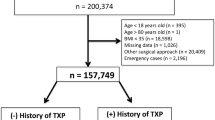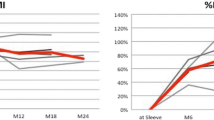Abstract
Introduction
Obesity is frequently encountered in patients with orthotopic liver transplant (OLT). The role of bariatric surgery is still unclear for this specific population. The aim of this study was to review our experience with laparoscopic sleeve gastrectomy (LSG) after OLT.
Material and Methods
We performed a retrospective case-control study of patients undergoing LSG after OLT from 2010 to 2016. OLT-LSG patients were matched by age, sex, body mass index (BMI), and year to non-OLT patients undergoing LSG. Demographics, operative variables, postoperative events, and long-term weight loss with comorbidity resolution were collected and compared between cases and controls.
Results
Of 303 patients undergoing LSG, 12 (4%) had previous OLT. They were matched to 36 non-OLT patients. No difference was found between groups in the American Society of Anesthesiologists class, mean operative time, or postoperative morbidity. The non-OLT group, however, had a significantly shorter mean hospital stay than the OLT group (1.7 vs 3.1 days; P < .001). There were no conversions to open procedures. For patients with long-term follow-up, change in BMI after LSG was similar between the groups, but the non-OLT patients had significantly more excess body weight loss at 2 years (53.7 vs 45.2%; P < .001). Similar resolution of comorbid conditions was noted in both groups. LSG caused no changes in dosage of immunosuppressive medications, and no liver complications occurred.
Conclusion
LSG after OLT in appropriately selected patients appears to have similar outcomes to LSG in non-OLT patients.



Similar content being viewed by others
Abbreviations
- BMI:
-
body mass index
- EBWL:
-
excess body weight loss
- LSG:
-
laparoscopic sleeve gastrectomy
- NASH:
-
non-alcoholic steatohepatitis
- OLT:
-
orthotopic liver transplant
- RYGB:
-
Roux-en-Y gastric bypass
References
Lazzati A, Iannelli A, Schneck AS, et al. Bariatric surgery and liver transplantation: a systematic review a new frontier for bariatric surgery. Obes Surg. 2015;25(1):134–42.
Wang Y, Beydoun MA. The obesity epidemic in the United States—gender, age, socioeconomic, racial/ethnic, and geographic characteristics: a systematic review and meta-regression analysis. Epidemiol Rev. 2007;29:6–28.
Wang Y, Beydoun MA, Liang L, et al. Will all Americans become overweight or obese? Estimating the progression and cost of the US obesity epidemic. Obesity (Silver Spring, Md). 2008;16(10):2323–30.
Cottam D, Qureshi FG, Mattar SG, et al. Laparoscopic sleeve gastrectomy as an initial weight-loss procedure for high-risk patients with morbid obesity. Surg Endosc. 2006;20(6):859–63.
Singh S, Watt KD. Long-term medical management of the liver transplant recipient: what the primary care physician needs to know. Mayo Clin Proc. 2012;87(8):779–90.
Buchwald H, Avidor Y, Braunwald E, et al. Bariatric surgery: a systematic review and meta-analysis. JAMA. 2004;292(14):1724–37.
Heimbach JK, Watt KD, Poterucha JJ, et al. Combined liver transplantation and gastric sleeve resection for patients with medically complicated obesity and end-stage liver disease. Am J Transplant: Off J Am Soc Transplant Am Soc Transplant Surg. 2013;13(2):363–8.
Bhati C, Idowu MO, Sanyal AJ, et al. Long term outcomes in patients undergoing liver transplantation for nonalcoholic steatohepatitis related cirrhosis. Transplantation. 2017.
Charlton MR, Burns JM, Pedersen RA, et al. Frequency and outcomes of liver transplantation for nonalcoholic steatohepatitis in the United States. Gastroenterology. 2011;141(4):1249–53.
Richards J, Gunson B, Johnson J, et al. Weight gain and obesity after liver transplantation. Transplant Int: Off J Eur Soc Organ Transplant. 2005;18(4):461–6.
Laish I, Braun M, Mor E, et al. Metabolic syndrome in liver transplant recipients: prevalence, risk factors, and association with cardiovascular events. Liver Transplant: Off Publ Am Assoc Study Liver Dis Int Liver Transplant Soc. 2011;17(1):15–22.
El Atrache MM, Abouljoud MS, Divine G, et al. Recurrence of non-alcoholic steatohepatitis and cryptogenic cirrhosis following orthotopic liver transplantation in the context of the metabolic syndrome. Clin Transpl. 2012;26(5):E505–12.
Livingston EH. Obesity and its surgical management. Am J Surg. 2002;184(2):103–13.
Office of the Surgeon G, Office of Disease P, Health P, Centers for Disease C, Prevention, National Institutes of H. Publications and Reports of the Surgeon General. The Surgeon General’s Call To Action To Prevent and Decrease Overweight and Obesity. Rockville (MD): Office of the Surgeon General (US); 2001.
Butte JM, Devaud N, Jarufe NP, et al. Sleeve gastrectomy as treatment for severe obesity after orthotopic liver transplantation. Obes Surg. 2007;17(11):1517–9.
Elli EF, Masrur MA, Giulianotti PC. Robotic sleeve gastrectomy after liver transplantation. Surg Obes Relat Dis: Off J Am Soc Bariatric Surg. 2013;9(1):e20–2.
Lin MY, Tavakol MM, Sarin A, et al. Safety and feasibility of sleeve gastrectomy in morbidly obese patients following liver transplantation. Surg Endosc. 2013;27(1):81–5.
Khoraki J, Katz MG, Funk LM, et al. Feasibility and outcomes of laparoscopic sleeve gastrectomy after solid organ transplantation. Surg Obes Relat Dis: Off J Am Soc Bariatric Surg. 2016;12(1):75–83.
Dindo D, Demartines N, Clavien PA. Classification of surgical complications: a new proposal with evaluation in a cohort of 6336 patients and results of a survey. Ann Surg. 2004;240(2):205–13.
Sarela AI, Dexter SP, O'Kane M, et al. Long-term follow-up after laparoscopic sleeve gastrectomy: 8–9-year results. Surg Obes Relat Dis: Off J Am Soc Bariatric Surg. 2012;8(6):679–84.
Weiss H, Nehoda H, Labeck B, et al. Organ transplantation and obesity: evaluation, risks and benefits of therapeutic strategies. Obes Surg. 2000;10(5):465–9.
Weir MR, Fink JC. Risk for posttransplant diabetes mellitus with current immunosuppressive medications. Am J Kidney Dis: Off J Natl Kidney Found. 1999;34(1):1–13.
Gentileschi P, Venza M, Benavoli D, et al. Intragastric balloon followed by biliopancreatic diversion in a liver transplant recipient: a case report. Obes Surg. 2009;19(10):1460–3.
Chan G, Garneau P, Hajjar R. The impact and treatment of obesity in kidney transplant candidates and recipients. Can J Kidney Health Dis. 2015;2:26.
Kumar N, Bazerbachi F, Rustagi T, et al. The influence of the Orbera intragastric balloon filling volumes on weight loss, tolerability, and adverse events: a systematic review and meta-analysis. Obes Surg. 2017;
Tichansky DS, Madan AK. Laparoscopic Roux-en-Y gastric bypass is safe and feasible after orthotopic liver transplantation. Obes Surg. 2005;15(10):1481–6.
Author information
Authors and Affiliations
Corresponding author
Ethics declarations
Ethical Approval Statement
For this type of study, formal consent is not required.
Informed Consent Statement
Does not apply
Conflict of Interest Disclosure Statement
The authors declare that they have no conflict of interest.
Rights and permissions
About this article
Cite this article
Tsamalaidze, L., Stauffer, J.A., Arasi, L.C. et al. Laparoscopic Sleeve Gastrectomy for Morbid Obesity in Patients After Orthotopic Liver Transplant: a Matched Case-Control Study. OBES SURG 28, 444–450 (2018). https://doi.org/10.1007/s11695-017-2847-7
Published:
Issue Date:
DOI: https://doi.org/10.1007/s11695-017-2847-7




